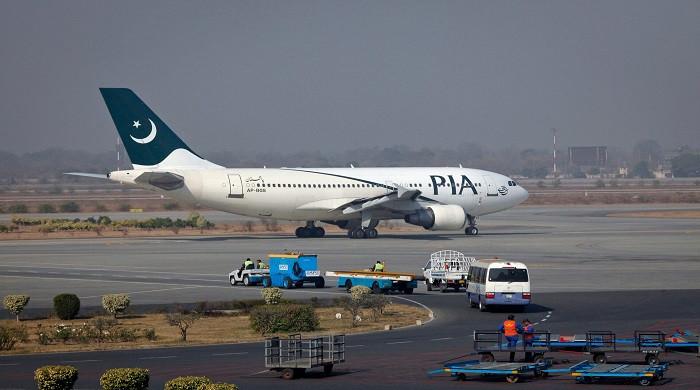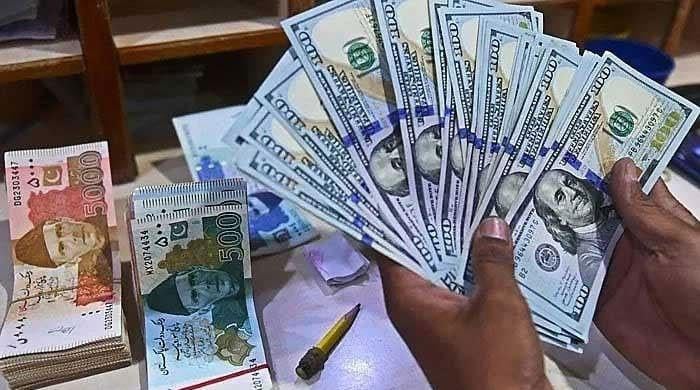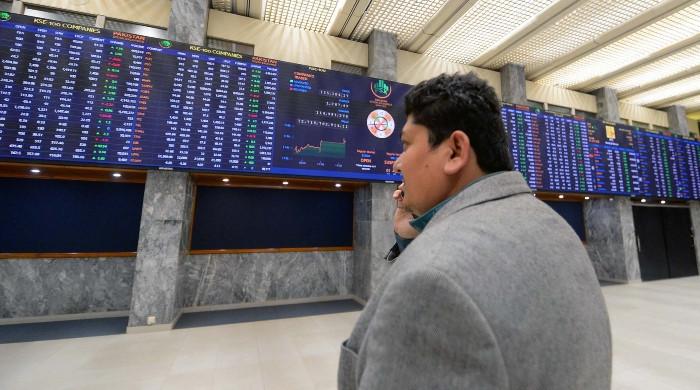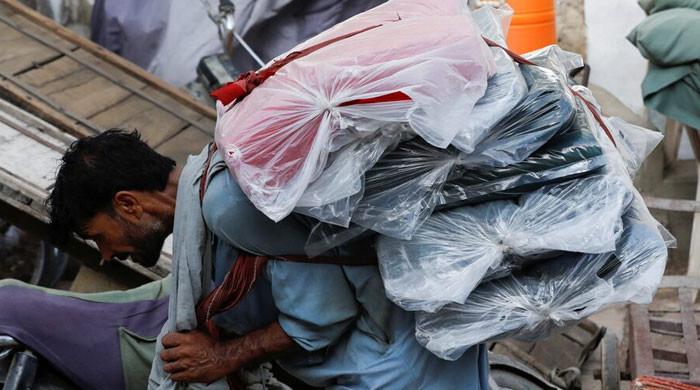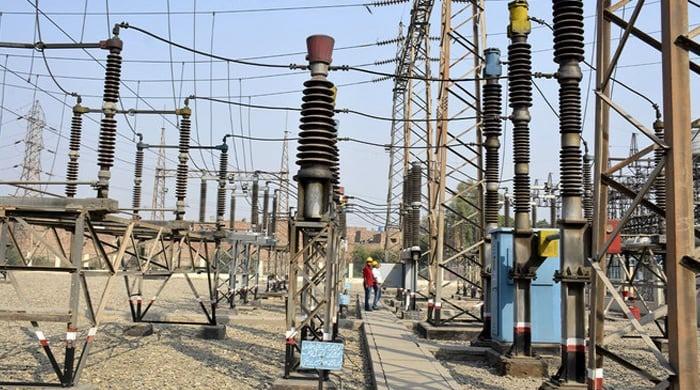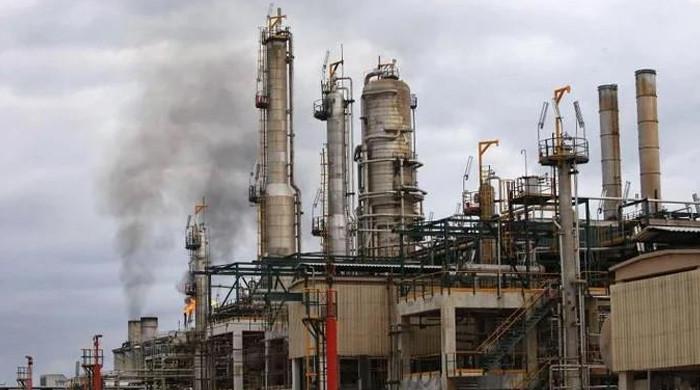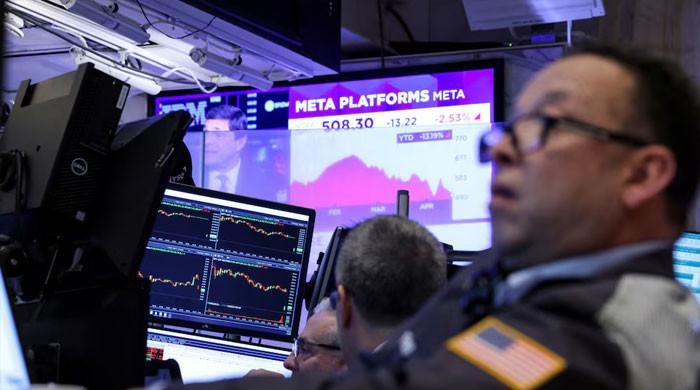KP govt unveils Rs1,332bn 'balanced' budget for year 2022-23
KP government announces increase of 15% in salaries and 16% rise in pensions
June 13, 2022
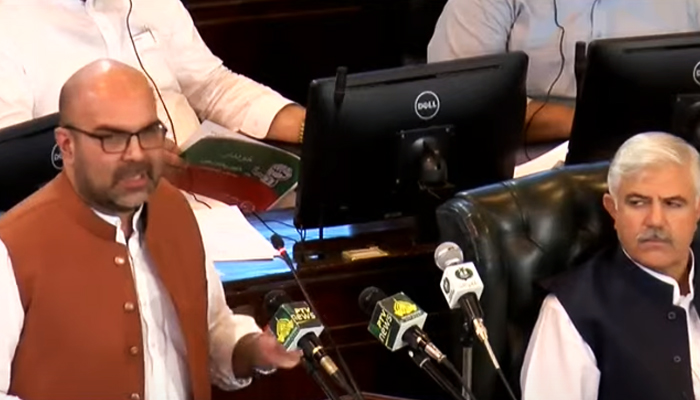
- KP announces increase of 15% in salaries and 16% rise in pensions.
- The volume of the total development budget is Rs383.5 billion.
- Taimur Jhagra says Rs447.9 billion would be spent on salaries.
PESHAWAR: The Khyber Pakhtunkhwa government has presented a Rs1,332 billion "balanced budget" for the financial year 2022-23, including an allocation of Rs1108.9 billion for settled districts and Rs223.1 billion for merged tribal districts.
Presenting the incumbent government's fourth budget on the floor of the Khyber Pakthunkhwa Assembly, Finance Minister Taimur Salim Jhagra announced an increase of 15% in salaries and a 16% rise in the pension of government employees.
The finance minister maintained that the government has decided to introduce the "Contributory Contributory Pension Scheme" for new government employees.
The minister said that 10% of the basic salary of the new government employees would be added to the pension fund on a monthly basis, adding that the total development budget of KP was Rs418.2 billion — including Rs319.2 billion for settled districts and Rs99 billion for merged tribal districts.
Regarding revenue and receipts collection, the minister said that total receipts were estimated at Rs1,332 billion, of which Rs750.9 billion will be collected from federal taxes receipts.
The finance minister said Rs31 billion would be collected through oil and gas royalty and surcharge and Rs61.9 billion through net hydel power.
He added that Rs85 billion would be collected through provincial tax and non-tax revenue, Rs4.3 billion under the head of foreign programme assistance (FPA) for settled districts and Rs208.7 billion grants for merged tribal districts, besides Rs212.7 billion receipts through other resources.
Jhagra said that Rs447.9 billion would be spent on salaries, including Rs372.1 billion in settled districts and Rs75.8 billion in merged tribal districts, while Rs107 billion on pension, including Rs106 billion in settled districts and Rs1 billion in merged tribal districts.
Besides salaries, he said Rs247.4billion would be spent on O&M, emergency, and district expenditures, and Rs111.4 billion on other current expenditures.
He said that the volume of provincial development programmes, including the accelerated development programme budget was Rs241 billion — including Rs185 billion for settled districts and Rs56 billion for merged tribal districts.
The volume of the total development budget was Rs383.5 billion — including 319.2 billion for settled districts and Rs64.3billion for merged tribal districts.
Under foreign programme assistance, Rs93.2 billion would be spent, including Rs88.9 billion for settled districts and Rs4.3 billion for merged tribal districts, while 8.3 billion would be received through the Public Sector Development Programme for settled districts.
The minister said that Rs26,458 million would be spent on agriculture, Rs4,191 on Aukaf and Religious Affairs, Rs73 million on Bureau of Statistics, Rs7,1653 million on communication and works, Rs227,087 million for elementary and secondary education, Rs29,203 million on energy and power, Rs4,191 million for the environment, Rs1,607 million for excise and taxation, Rs32,446 million through finance, Rs6,433 million through forestry, Rs6,655 million through general administration, Rs205,725 million for health, Rs34,191 million through higher education, Rs101,572 million for home and Rs823 million for housing sectors.
Likewise, Rs4,926 million were allocated for industries, Rs1,808 million for information and public relations, Rs2,990 million for information technology, Rs25,725 million for irrigation, Rs1,033 million for labour, Rs1,4377 million for law and justice, Rs,22337 million for local government, Rs1426 million for mines and mineral, Rs64372 million for planning and development, Rs3,616 million for population welfare, Rs2,3071 million for public health engineering, Rs30,003 million for relief, rehabilitation and settlement, Rs3,045 million revenue and estate, Rs6,068 million for social welfare, Rs2,2017 million sports, culture and tourism, Rs2,849 million through technical education, Rs1,2151 million for transport and Rs392 million for Zakat and Usher.





